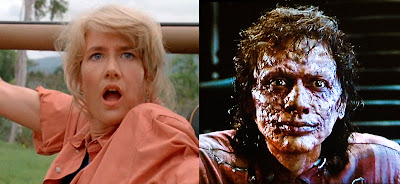"Black Swan," Darren Aronofsky, Film Review
The lesbian scene between Natalie Portman and Mila Kunis in Black Swan was highly publicized and leads to the suspicion that – rather than being essential for the structure and plot of the film – it was inserted as a ruse to persuade men to pay money to watch a film about ballet.
WARNING: CONTAINS SPOILERS
Follow @MichaelHardach
That's not entirely fair since it does show the pent-up sexual frustrations of the character, Nina, as well as expanding on the is-it-real-or-is-it-imaginary structure of the play. It also gives a suitably climatic end to the nightclub scenes, which are nicely juxtaposed between the classical ballet, as well as making Nina late the following morning for a critical rehearsal. But the lesbian theme doesn't really go anywhere in Black Swan. Nina's sexual frustrations could easily have been shown another way, and this comes after the similarly tacked-on lesbian scene in Aronofsky's earlier film, Requiem for a Dream.
Requiem was way too melodramatic for my tastes and each of its strands unrealistically grim to the point of sadism. Black Swan is also highly emotionally intense but in my opinion is more successful overall due to its more developed characterisation and film-length single plot.
Review continues below...
Inspire your baby with the Visual Baby series of picture ebooks. Original patterns and art designed for young eyes. Try them today by clicking the covers below.
"It's the only thing that stops her crying" Katie Alison
"All three of my children love this book" Janice Peterson
"Moons, trees, leaves... fabulous!" Linda Matson
The inner lives of the characters are shown convincingly in Black Swan. For example, we hear the older, pushed-out star in her dressing room saying "Fuck, fuck, fuck!" to herself.
Once you accept that nothing you're seeing can be trusted, it gives a strangely liberating feel to the narrative. It's a striking way to explore feelings, personal conflict and the 'truth' of characters without being tied to humdrum reality. Aronofsky pulls off a kind of hallucinatory magic realism throughout the film.
It was good to see Natalie Portman getting her Oscar for this performance. In the film, Nina is a perfect match for the white swan but until the end the jury's out on whether she can pull off the dual role of the black swan. Of course, in real life, Portman didn't get to where she is today by being a wallflower and the Oscar-winning acting is surely what she's doing for most of the film as the repressed white swan. The final scenes of smoking hot sexuality as the black swan must have been as easy for Portman to pull off as a walk in the park.
'Would you fuck that?' says the ballet director to her male partner earlier in the film during rehearsals. The male dancer scoffs. 'No, of course you wouldn't. No one would,' says the ballet director. But in the final black swan performance, the same dancer reels away, dazed and confused by the force of the black swan's new-found sexuality.
Personal Score: 6/10
Follow @MichaelHardach
This is part of a series of film reviews where I give my comments on IMDB Top 250 films as a writer. The idea is that over time these posts will build into a wide-ranging writing resource.
For more details about the approach I've taken, including some important points about its strengths and weaknesses (I make no claims about my abilities as a film critic or even the accuracy of my comments... but I do stand by the value of a writer's notes on interesting films), see my introductory post here.






